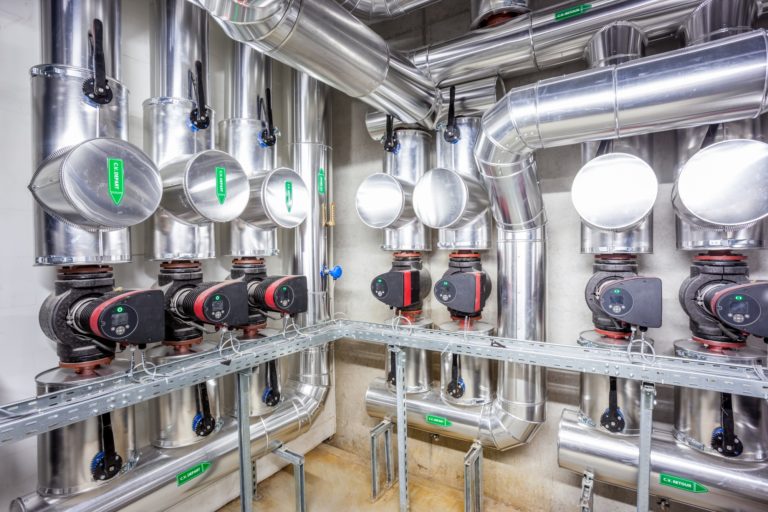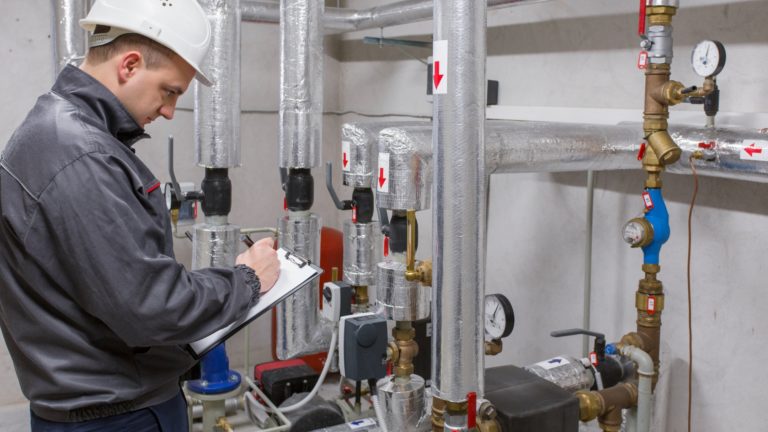To make this measure more effective and tailored to the specific context of your company, we recommend that you first perform an overall analysis of your energy situation.
The heating installation: an important leverage point in the energy transition
The heat production unit is a major leverage point for a successful energy transition. As its primary purpose is to supply heat for comfort and operational needs, the heating system must be scaled to provide the temperature levels and necessary quantities to keep the business running. Nowadays, there are heat production systems that are adapted to each temperature level are flexible in terms of power and are environmentally friendly.
Definition of the company’s heating requirements
Analysis of the current situation
- Determine the different parameters of the current installation, e.g. age, general condition, temperature level, consumption and associated costs, etc.
Needs assessment by a qualified tradesman (heating installer) or by an consulting engineering office
- Analysis of general heating requirements in accordance with DIN EN 12831.
- Analysis of the power required by heat-consuming appliances
- Analysis and reassessment of the temperature levels required for the various applications.
Identification of the solution and verification of the feasibility of the heating installation project
Definition of the solution
- Based on the needs analysis, a solution is defined in collaboration with a supplier, a consulting engineering office or with a qualified professional (heating installer).
- In addition to the main heat production unit, recovering waste heat and the unit with solar thermal heating must also be taken into consideration.
Verification of the proposed heating installation regarding operating permits
When adapting existing installations and particularly when setting up new installations, check the nomenclature of classified establishments.
Drawing up specifications and requesting tenders for the heating system project
Subsidy application
Please note: any application for government or non-government subsidies must comply with the “incentive effect”, subject to compliance with the subsidy conditions.
To respect the “incentive effect”, no binding commitment (cost estimation signed; payed a deposit) can be made BEFORE having received the tentative settlement from the State or the electricity and natural gas supplier following an assistance request.
Government subsidies
- “Fit 4 Sustainability” programme
- The Fit 4 Sustainability programme co-finances an environmental audit + action plan on one or more of the topics selected by the company (energy, greenhouse gases, waste, water, etc.).
- Assistance of up to 50%, 60% and 70% of the fees for carrying out an environmental study (energy audit and/or carbon assessment) + detailed, costed action plan to reduce consumption/GHGs (medium- and long-term investment, ROI, etc.) – open to SMEs and large companies (except those required to carry out a statutory audit).
- For questions : Luxinnovation
- SME Packages – Sustainability
- Financial Aid for small and medium-sized enterprises covering up to 70% of eligible costs for the implementation of a project aimed at reducing the environmental impact. The eligible project budget must be in a range from 3.000 € to 25.000 € excl. VAT.
- For more information:
- Chambre des Métiers for craft companies
- Chamber of Commerce for businesses in the non-crafts sectors
- SME scheme – Subsidies for consultancy services
- Support for small and medium-sized businesses, up to 50% of external consultancy fees
- Examination of project eligibility and organisation granting the subsidy: Ministry of the Economy (Department for Support to SMEs).
- For further information:
- House of Entrepreneurship of the Chamber of Commerce
- Chambre des Métiers
- Environmental protection scheme – Investment subsidies for environmental protection
- Examination of company eligibility and costs: General Directorate – Industry, New Technologies, and Research
- Support in drawing up the subsidy application file before the submission to the Ministry of the Economy
- For further information: Luxinnovation
- More information and assistance for businesses on environmental investment is available in the Simplified Guide for Businesses (FR).
N.B. Government subsidies cannot be accumulated for the same project.
Application for subsidies from electricity and natural gas suppliers
As of 2015, natural gas and electricity suppliers are obliged under the Commitment Mechanism to generate some energy savings among their consumers. Since then, energy suppliers have been offering monitoring and advisory services as well as subsidy programmes for consumers to implement energy efficiency measures.
The providers offering this service to companies are as follows:
- Enoprimes Enovos + SUDenergie
- SUDenergie
- Sudstroum
It should be noted that the subsidies from suppliers can be accumulated with any state subsidies for the same project.
After the heating installation has been carried out
- Inspection of the installation by a representative of the Chambre des Métiers
- Approval of any new heating installation using diesel, solid fuel or gas by the SCRB Department of the Chambre des Métiers mendatory.
- Scheduling of regular maintenance and inspection of the installation.

